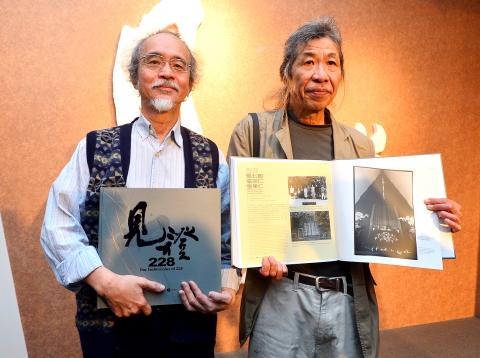As the nation prepares to mark the 68th anniversary of the 228 Incident on Saturday, the 228 Memorial Foundation yesterday released a collection of photographs and interviews recounting the stories of families affected by the massacre.
Completed over a course of five years, the two-volume collection, titled Testimonies of 228 (見證228), features black-and-white portraits of the people interviewed, who include both elderly survivors and family members from around the nation.
Short excerpts from the interviews are presented in both Mandarin and English.

Photo: Wang Yi-sung, Taipei Times
The compilation was produced by photojournalist Pan Hsiao-shia (潘小俠), human rights activist and oral history expert Chen Ming-cheng (陳銘城) and historian and former political prisoner Yang Bi-chuan (楊碧川).
Over the course of four years, beginning in 2010, the trio traveled across the nation to interview a total of 228 families who were affected by the incident.
Pan embarked on the journey after he completed a photojournalism project focusing on victims of political prosecution during the White Terror era, which followed the 228 Incident and reached its peak during the 1950s and 1960s.
“We interviewed so many people. While the stories were different, they evoked the same emotions,” Yang said, adding that through the work of historians, Taiwanese have slowly uncovered the truth about the 228 Incident.
The foundation said that photographs and images related to the 228 Incident are scarce because the incident was considered taboo during the Martial Law era.
The Incident began on the afternoon of Feb. 27, 1947, when six agents of the Monopoly Bureau’s Taipei branch tried to confiscate illegal cigarettes that widow Lin Chiang-mai (林江邁) was selling in front of the Tien-ma Tea House and her money. After she refused to hand over her stock, she was pistol-whipped on the head and passed out, triggering protests from bystanders. As the agents fled the scene, they opened fire on the crowd, wounding one man, who died the next day.
When word of the incident spread, police stations and military police headquarters were besieged by protesters demanding the Monopoly Bureau agents be prosecuted. The following morning, demonstrators ransacked the Monopoly Bureau’s Taipei branch office. When a crowed gathered in front of the Provincial Executive Office in the afternoon to petition the government over the incidents, military police opened fire with machine guns, killing or injuring several dozen people.
The Garrison Command Headquarters declared a state of emergency and in the ensuing months, a crackdown by the then-Chinese Nationalist Party (KMT) government saw tens of thousands of Taiwanese detained or killed, including a large number of the intellectual elite.
Additional reporting by staff writer

An essay competition jointly organized by a local writing society and a publisher affiliated with the Chinese Communist Party (CCP) might have contravened the Act Governing Relations Between the People of the Taiwan Area and the Mainland Area (臺灣地區與大陸地區人民關係條例), the Mainland Affairs Council (MAC) said on Thursday. “In this case, the partner organization is clearly an agency under the CCP’s Fujian Provincial Committee,” MAC Deputy Minister and spokesperson Liang Wen-chieh (梁文傑) said at a news briefing in Taipei. “It also involves bringing Taiwanese students to China with all-expenses-paid arrangements to attend award ceremonies and camps,” Liang said. Those two “characteristics” are typically sufficient

A magnitude 5.9 earthquake that struck about 33km off the coast of Hualien City was the "main shock" in a series of quakes in the area, with aftershocks expected over the next three days, the Central Weather Administration (CWA) said yesterday. Prior to the magnitude 5.9 quake shaking most of Taiwan at 6:53pm yesterday, six other earthquakes stronger than a magnitude of 4, starting with a magnitude 5.5 quake at 6:09pm, occurred in the area. CWA Seismological Center Director Wu Chien-fu (吳健富) confirmed that the quakes were all part of the same series and that the magnitude 5.5 temblor was

The brilliant blue waters, thick foliage and bucolic atmosphere on this seemingly idyllic archipelago deep in the Pacific Ocean belie the key role it now plays in a titanic geopolitical struggle. Palau is again on the front line as China, and the US and its allies prepare their forces in an intensifying contest for control over the Asia-Pacific region. The democratic nation of just 17,000 people hosts US-controlled airstrips and soon-to-be-completed radar installations that the US military describes as “critical” to monitoring vast swathes of water and airspace. It is also a key piece of the second island chain, a string of

The Central Weather Administration has issued a heat alert for southeastern Taiwan, warning of temperatures as high as 36°C today, while alerting some coastal areas of strong winds later in the day. Kaohsiung’s Neimen District (內門) and Pingtung County’s Neipu Township (內埔) are under an orange heat alert, which warns of temperatures as high as 36°C for three consecutive days, the CWA said, citing southwest winds. The heat would also extend to Tainan’s Nansi (楠西) and Yujing (玉井) districts, as well as Pingtung’s Gaoshu (高樹), Yanpu (鹽埔) and Majia (瑪家) townships, it said, forecasting highs of up to 36°C in those areas